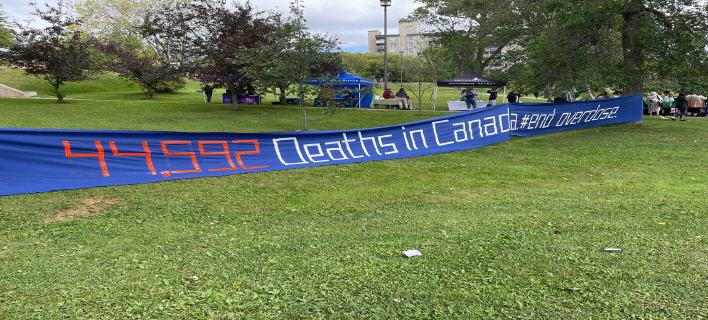Today, the Thunder Bay Drug Strategy commemorated International Overdose Awareness Day (IOAD) at Waverley Park, uniting community members, first responders, and local organizations, under the 2024 message of ‘Together We Can.’
The event aimed to raise awareness about the risks of overdose and promote harm reduction services – crucial strategies in combatting the ongoing and worsening toxic drug and overdose crisis. The day also highlighted the importance of community solidarity in addressing this public health issue.
A key feature of the event was the community art initiative, Upcycle for Change: Art as a Path to Recovery and Understanding, led by the Thunder Bay Drug Awareness Committee and CréAction Collective. This initiative fostered healing and provided an artistic medium for participants to share their emotions and experiences, helping to reduce the stigma associated with substance use and overdose.
In 2023, Ontario recorded over 2,600 overdose deaths, with Thunder Bay disproportionately impacted, having one of the highest rates of opioid-related deaths per capita in the province. “The toxic drug and overdose crisis has deeply affected our community,” said Rilee Willianen, Acting Drug Strategy Lead for Thunder Bay Drug Strategy. “Today, we honour those whose lives have been lost or harmed by overdose and stand in solidarity with the families, friends, and communities affected.”
The theme ‘Together We Can’ also underscores the urgent need for provincial and federal governments to invest in addressing the crisis that affects so many communities across the country. The Thunder Bay Drug Strategy continues to advocate for a comprehensive approach to substance use health, including a robust range of prevention, enforcement, harm reduction services, treatment options, mental health supports, and supportive housing. These services are essential for reducing public drug use, preventing overdose deaths, curbing the spread of infectious diseases, lessening the strain on emergency and medical services, and supporting individuals on their path to recovery.
As the street drug supply becomes increasingly toxic, it is more critical than ever to ensure access to life-saving harm reduction services like naloxone, drug checking, supervised consumption sites, and needle exchange programs. Without these resources, people may not live long enough to pursue recovery.
“We know the risks of overdose are higher when people use substances alone, and even more so when a person in recovery relapses. Ending the stigma around substance use is vital to saving lives,” added Willianen.
Available Harm Reduction Services in Thunder Bay
Safer Drug Use Equipment: Free, sterile needles, pipes, and other safer drug use supplies are available at various local organizations with harm reduction distribution programs. Visit this map to find a program nearby.
Naloxone: A life-saving medication that can reverse the effects of an opioid overdose, available through the Thunder Bay District Health Unit’s Harm Reduction Team, Superior Points (807) 621-7861 or (807) 621-7862 and at many pharmacies in Thunder Bay.
Supervised Consumption Services (SCS): Available at NorWest Community Health Centres until further notice, Monday to Saturday from 10:00 am – 6:00 pm. Provides a safe space for individuals to use drugs under supervision, reducing the risk of overdose.
Drug Checking Services: Offered at NorWest Community Health Centres, allowing people to quickly test substances for dangerous contaminants.
Outreach Harm Reduction Services: Delivering critical resources directly to people where they are, especially those who may not access traditional healthcare settings. Dial 211 to get connected.
LifeguardConnect App: A digital tool that helps prevent overdoses by monitoring individuals who are using drugs alone. The app also sends out drug alerts when a toxic or unexpected substance is found in the community.
Rapid Access to Addiction Medicine (RAAM) Clinics: Providing quick and flexible access to addictions medicine. Dial 211 to get connected.
Withdrawal Management Services: Available through the Balmoral Centre at (807) 623-6515, offering a safe environment for medically managing withdrawal symptoms.
“Our message is clear: harm reduction is evidence-based, and it saves lives. It must remain a central part of any strategy to prevent further tragedies and make sure that someone lives to see the day they choose treatment,” said Willianen.
-30-
Contact: Rilee Willianen, Acting Drug Strategy Lead, (807) 627-1453
Contact Us









